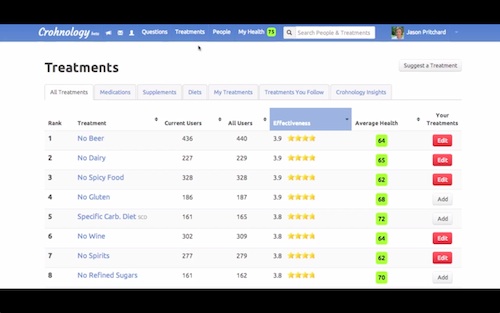 Crohnology.com
Crohnology.com
This week in digital health, Farzad Mostashari told MobiHealthNews that he would prefer that the Food and Drug Administration unilaterally issue a long-anticipated final guidance on mobile medical apps rather than waiting for inter-agency consensus, Healthbox announced its first Nashville class, and fitness equipment maker Precor launched a new developer portal for its open API, allowing interested parties to use data from Preva, Precor’s cloud-based engagement platform. The week was packed with stories, but there are still more to read. Here are some other stories we read this week.
Digital apps may radically reduce health-care costs -- Salon
Salon tells the story of online Crohn's disease community Chronology from the perspective of the founder, Sean Ahrens. The article quotes experts who say when patients communicate with each other about the disease, they don't go in for as many tests and doctors visits. Companies such as this one are not new to the mobile health space. In June, another company that also offers an online community for people with diseases, PatientsLikeMe, raised $7 million and a few months prior, the company launched a new open-participation research platform, funded by a $1.9 million grant from the Robert Wood Johnson Foundation’s Pioneer Portfolio.
Virtual reality, real help for veterans -- Boston Globe
One in five people who served in Afghanistan or Iraq suffer from symptoms of PTSD, the Globe article says. In order to combat the effects of a soldier's time at war, researchers are developing a virtual reality system for veterans to play in conjunction with therapy. The system has been distributed to about 70 clinics, according to the post. While some of these systems cost between $30,000 and $40,000, cheaper options have been available for at least a few years. In 2011, the VA created an app to help treat post traumatic stress disorder. Earlier this year, the Department of Defense launched an Android app, BioZen, to help veterans deal with symptoms of PTSD.
Smartphones can gather important medical data -- SF Gate
SF Gate's post on Dr. Paul Abramson's use of Mymee is an example of a quantified self app used in a clinical setting. The doctor was quoted saying he gets, "immeasurably more info about a patient" than he could have gotten on his own. He continues, "patients who have been my patients for years I'm finding out are completely different people than I thought they were." The quantified self movement has been growing with the rise of activity trackers, which is expected to grow to 248 million shipments in 2017. So much so, that at the close of this summer, MobiHealthNews counted 6 new baby activity trackers announced.
Health apps don't save people, people do -- CNN Money
Spinning out the other direction, CNN made the case that the quantified self movement has not yet proved itself. The post dove into research from Johns Hopkins that found health apps were "mediocre at best". The article then argues that the populations who would most likely benefit from a health app, the "technology venture capitalist or entrepreneur", would not be the audience that downloads them. Instead, the author writes, the audiences that need the app are elderly and poor populations. Recently, MobiHealthNews recently wrote a post on Doro, maker of phones for the elderly, in which the president of the company announced a partnership with activity tracker company Withings, which he believes will encourage that generation to use these tools.

















